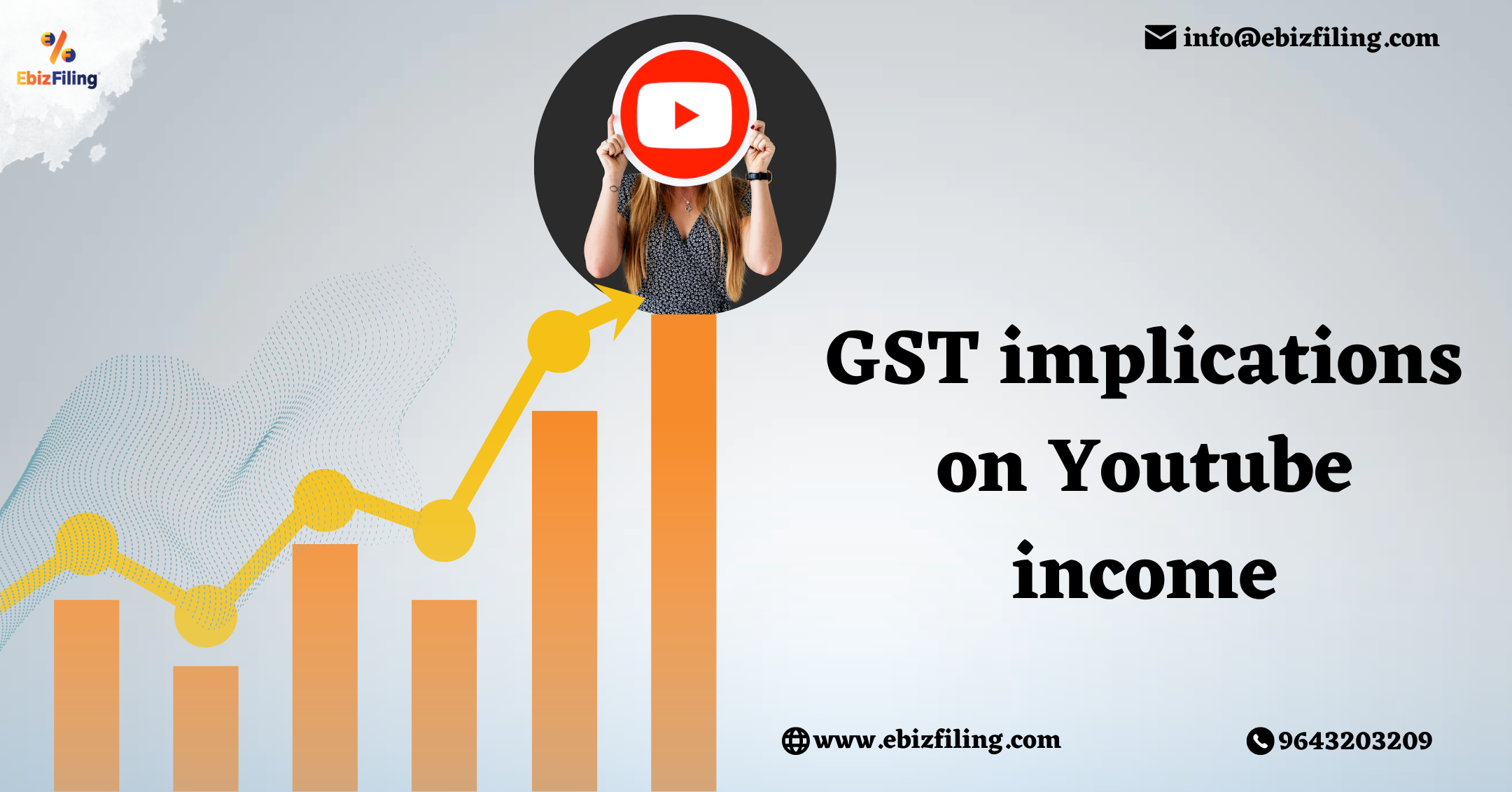
-
January 5, 2023
All you need to know about GST on Youtuber Revenue.
Table of Content
Introduction
It is crucial to understand how taxes are treated in India from the perspectives of income tax and GST Return. YouTube income, blogging income, money from video-sharing applications, and so on are all counted as passive income which is subject to the GST. There are taxation policies in place for such forms of income, such as GST on YouTube and blogging earnings. According to the IGST Act, the supply of goods or services, whether imported or exported from India, is subject to the IGST. The thorough information in this article will help you know more about the GST on Youtuber Revenue.
Introduction to Youtubers and Bloggers
Anyone can create a channel and upload videos using the YouTube platform, which is a part of the US-based Google corporation. In return, the company makes revenue by displaying advertisements and other promotional content on the videos it serves. One who manages a channel on YouTube is known as a “YouTuber.” According to YouTube policy, a YouTuber can start making money when their channel reaches a set number of subscribers and when their videos get a certain amount of views.
A blogger is a person who offers space for brands to display their advertisements. To serve as advertising channels, facilitator agencies act as a middleman between bloggers and businesses. Bloggers generally rely on advertising networks like Google AdSense to earn from clicks on the advertisements they place on their blogs. Bloggers will not be aware of the marketers using the Google AdSense system, which serves as a medium.
Can a Youtuber and blogger’s income be referred to as ‘Supply’?
The sale of goods or services is defined as a supply under GST. A “supply” under the GST is defined under Section 7 of the CGST Act. Only transactions that are covered by the supply definition are subject to GST returns. In addition, supplying goods or services in exchange for money will be counted as a supply. The CGST Act also defines “service” as anything other than goods, money, and securities. It also includes financial activity, unless the conversion is individually invoiced for a fee. YouTube users offer services by publishing videos and other content on their channels with the intention of making money and offering a platform for advertising. Bloggers provide services by giving a platform for advertisers to display and monetize their adverts.
Blogger services can be considered online database access and information retrieval services. Online Information and Database Access or Retrieval (OIDAR) services, as defined by Section 2(17) of the IGST Act, are services that use information technology to transmit information over the internet or another electronic network, including online advertising services.
Cases in which blogging and YouTuber services are supplied and taxed under the GST
When the supplier is based in India but the receiver and site of supply are both outside of India, the export of services is regarded as a supply under GST. Receiving consideration must be done in a convertible foreign currency, and the supply and beneficiary cannot be two separate establishments of the same individual.
There is a certain criteria of requirements which makes bloggers eligible to export services. Therefore, no GST in India is imposed as both the beneficiary and the location of the supply are outside the taxable area. Additionally, exporting goods and services is considered a zero-rated supply under Section 16(1)(a) of the IGST Act. In other words, a YouTube user provides Google AdSense with zero-rated services in exchange for the company placing adverts on the YouTube video. As a result, there are two choices available to YouTubers and bloggers who provide services to clients outside of India, such as Google, Youtube, etc. People must either pay GST on Youtuber revenue and then claim it back as a refund, or they must export services under the protection of a bond or Letter of Undertaking (LUT) in Form RFD-11 without paying GST.
GST rate for bloggers’ and YouTubers’
The GST rate that applies to the services provided by YouTubers and bloggers is 18% (i.e., 9% CGST, 9% SGST, or 18% IGST). This rate applies only if the YouTuber is required to register for GST or is already registered for GST. Wherever YouTubers or bloggers export services, they are regarded as zero-rated supplies, thus no GST is applied.
Conclusion
A GST invoice must be issued for every service delivered, and the invoice must precisely mention the invoice number, date of invoice, value of services offered, and GST rate, among other things. YouTubers and bloggers can raise a GST invoice in any manner, however, the law requires that certain things be listed on all GST invoices. All invoice information must be included in Form GSTR-1 of the GST returns. According to GST regulations, all invoices must be raised properly. Bloggers and YouTubers must submit GSTR-1 and GSTR-3B tax returns.
GST Returns
Get your GST return filings done through experts at ebizfiling
About Ebizfiling -





Reviews
Akshay shinde
23 Apr 2019Excellent service…
bharth waj
09 Apr 2022Great experience. Helped me incorporate my company at an affordable price. Also provided good customer support in all stages and clarified all of my queries. Thank you Ebizfiling for your service.
Devangi Patnayak
11 Mar 2018I am very happy with the way they serve their clients. They are focused on providing the best help that they can and are result oriented.
March 19, 2024 By Team Ebizfiling
All You Need To Know About HSN Code Of Horticulture Introduction Horticulture, encompassing the cultivation of plants for food, medicine, and aesthetic purposes, stands as a pivotal sector within agriculture, playing a vital role in economic sustenance and human welfare. […]
January 31, 2024 By Dharmik Joshi
Compliance Calendar For The Month Of February 2024 As we move into February 2024, the business compliance scenario in India remains as critical as ever. The commitment to meet various legal obligations throughout the financial year is a top priority […]
January 12, 2024 By Dharmik Joshi
GST LUT का उपयोग करने के क्या लाभ हैं? परिचय एक GST-पंजीकृत करदाता LUT (लेटर ऑफ अंडरटेकिंग) का उपयोग करके आपूर्ति के समय एकीकृत GST (IGST) का भुगतान किए बिना उत्पादों या सेवाओं का निर्यात कर सकता है। वस्तुओं या सेवाओं […]